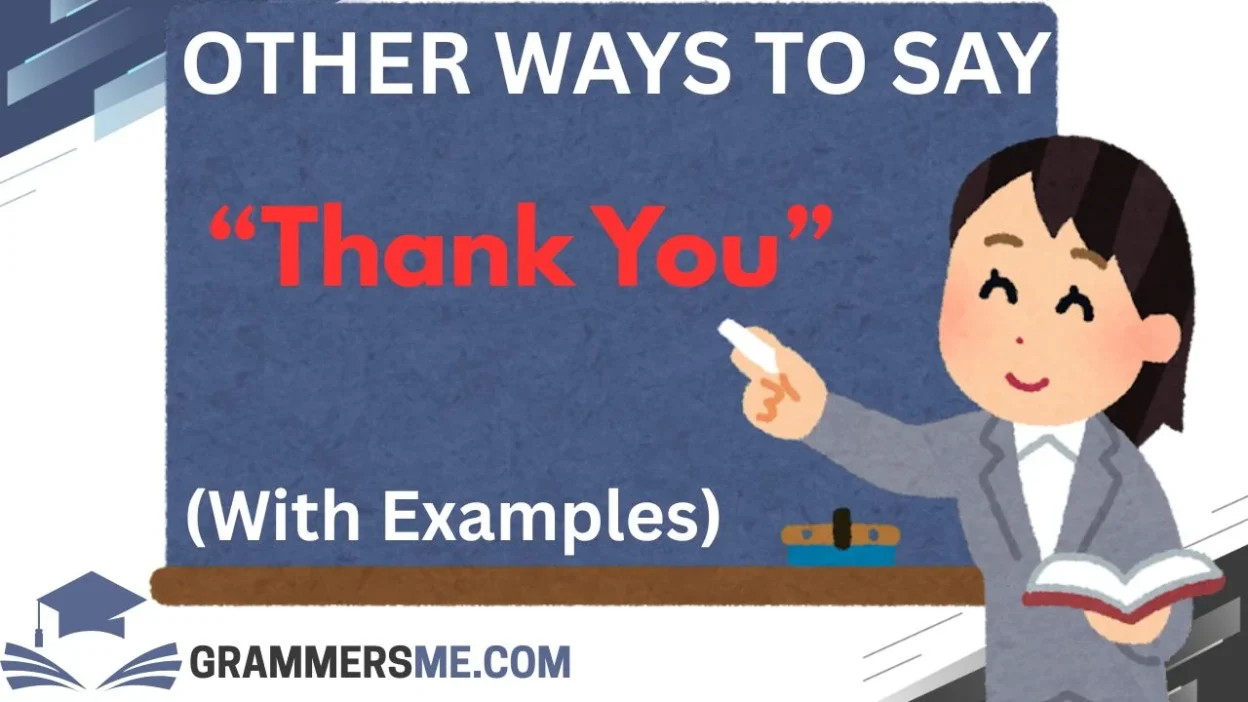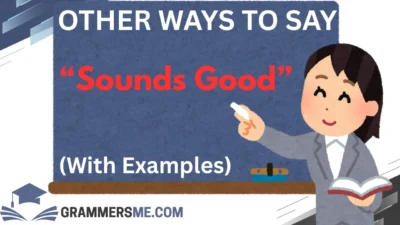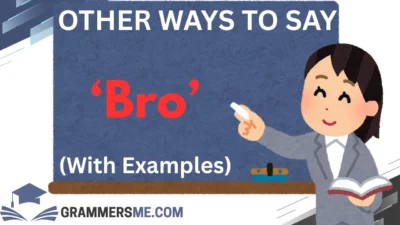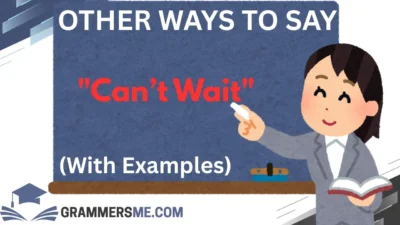Expressing gratitude is one of the simplest, yet most profound ways to connect with others. Whether you’re thanking a friend for their support, a colleague for their help, or a loved one for their kindness, the words you use can make your appreciation feel more personal and meaningful.
Sometimes, saying “thank you” in a different way can not only convey your gratitude more deeply but also strengthen your relationship with the recipient. In this article, we explore 30 other ways to say “thank you” that can add warmth, care, and thoughtful phrasing to your expressions of gratitude.
What Does “Thank You” Mean?
Before diving into the alternatives, it’s important to understand the essence of saying “thank you.” It’s more than just a phrase—it’s an acknowledgment of kindness, generosity, or help that has been given to you. It expresses your appreciation and respect for someone else’s actions, making them feel valued and seen.
However, saying “thank you” can sometimes feel routine or impersonal, which is why exploring other ways to express gratitude can help make your words stand out.
Is It Professional/Polite to Say “Thank You”?
Yes, “thank you” is universally seen as polite and professional. It’s an essential part of good manners and helps build and maintain positive relationships, whether in personal or professional settings. However, depending on the tone and context, some alternatives might be more fitting for specific situations.
For example, in formal business emails, phrases like “I appreciate your assistance” or “I’m grateful for your support” may come across as more professional than a casual “thanks.” Choosing the right alternative helps ensure your message aligns with the tone and setting of the interaction.
1. I Appreciate It
- Meaning: Expresses a deep acknowledgment of someone’s effort or kindness.
- Explanation: A sincere way of showing gratitude that highlights how much you value the help or gesture.
- Scenario Example: “Thanks for all your hard work on this project. I really appreciate it.”
- Best Use: For both casual and professional settings. It works well when someone has gone out of their way to help you.
- Tone: Warm, genuine, respectful.
- Not Use: In situations where you need to emphasize gratitude more formally, such as in highly official emails.
2. I’m Grateful
- Meaning: A heartfelt expression of thankfulness.
- Explanation: This phrase communicates a deeper level of appreciation and emotion.
- Scenario Example: “I’m grateful for everything you’ve done to help me out during this tough time.”
- Best Use: When expressing gratitude for something significant, often when emotional or personal circumstances are involved.
- Tone: Warm, sincere, empathetic.
- Not Use: When you want to keep things light or casual.
3. Much Obliged
- Meaning: A somewhat old-fashioned way to express gratitude.
- Explanation: Often used in more formal or traditional settings, implying a sense of indebtedness.
- Scenario Example: “I’m much obliged for your assistance in completing the project on time.”
- Best Use: Professional or formal settings, especially in situations where you want to sound courteous.
- Tone: Formal, respectful.
- Not Use: Casual or modern environments where a simpler expression might feel more appropriate.
4. I Can’t Thank You Enough
- Meaning: Emphasizes that the gratitude being expressed is beyond words.
- Explanation: Used when you feel like a simple “thank you” doesn’t do justice to how much you appreciate someone’s actions.
- Scenario Example: “You really helped me out in a big way with the presentation. I can’t thank you enough.”
- Best Use: In situations where someone has gone above and beyond.
- Tone: Sincere, emotional.
- Not Use: When the help received wasn’t extraordinary, as it may seem exaggerated.
5. I’m So Thankful
- Meaning: A casual, emotional way to express thanks.
- Explanation: An informal way of showing gratitude, often used in close relationships or everyday scenarios.
- Scenario Example: “I’m so thankful you were able to lend me your notes for the class.”
- Best Use: Among friends, family, or colleagues in less formal environments.
- Tone: Warm, casual.
- Not Use: In professional or formal communications.
6. You’ve Made My Day
- Meaning: Acknowledging that someone’s actions have made a positive impact on your day.
- Explanation: This phrase conveys that the gesture or help has significantly brightened your mood.
- Scenario Example: “Your kind words really lifted my spirits today. You’ve made my day.”
- Best Use: When someone has done something thoughtful or kind for you.
- Tone: Cheerful, appreciative.
- Not Use: In formal business contexts, unless it’s to a colleague with whom you have a friendly relationship.
7. I Owe You One
- Meaning: A casual expression of gratitude, implying you’ll return the favor.
- Explanation: This phrase conveys thanks while offering something in return.
- Scenario Example: “Thanks for helping me with my research. I owe you one!”
- Best Use: With friends, family, or close colleagues where informal interactions are common.
- Tone: Friendly, informal.
- Not Use: In highly formal situations or when you don’t intend to actually return the favor.
8. Thanks a Million
- Meaning: An enthusiastic way to say thank you, implying a very high level of appreciation.
- Explanation: It’s a playful, energetic way to express gratitude.
- Scenario Example: “Thanks a million for covering my shift today!”
- Best Use: In informal, friendly settings or when you want to convey high energy.
- Tone: Energetic, grateful.
- Not Use: In formal or serious situations where such informal expressions might not feel appropriate.
9. I Truly Appreciate It
- Meaning: A sincere way to show your appreciation.
- Explanation: This phrase highlights how genuine your gratitude is.
- Scenario Example: “I truly appreciate your help with the fundraising event.”
- Best Use: For both personal and professional settings, when you want to emphasize sincerity.
- Tone: Sincere, respectful.
- Not Use: When you’re thanking someone for something trivial.
10. Many Thanks
- Meaning: A slightly more formal, but still warm, expression of gratitude.
- Explanation: A polite and courteous alternative to “thank you,” often used in written communications.
- Scenario Example: “I look forward to hearing back from you. Many thanks in advance for your time.”
- Best Use: In emails, formal letters, or business communications.
- Tone: Formal, respectful.
- Not Use: In highly casual conversations.
11. I’m Deeply Grateful
- Meaning: An expression that conveys a profound level of gratitude.
- Explanation: Used when you want to convey deep emotional thanks for someone’s significant contribution.
- Scenario Example: “I’m deeply grateful for all the support you’ve given me during this difficult time.”
- Best Use: In personal, heartfelt situations.
- Tone: Warm, heartfelt, emotional.
- Not Use: When the gesture isn’t particularly significant or emotional.
12. You’re a Lifesaver
- Meaning: A casual, enthusiastic way to express thanks, typically for help in urgent situations.
- Explanation: It highlights that the person’s assistance was crucial to solving a problem.
- Scenario Example: “You’re a lifesaver for picking up my kids from school today!”
- Best Use: In casual situations where someone has come to your rescue.
- Tone: Casual, grateful.
- Not Use: In formal situations where a more neutral expression would be appropriate.
13. I Don’t Know What I’d Do Without You
- Meaning: A way to express deep gratitude for someone’s ongoing support or assistance.
- Explanation: It conveys that the person’s help is so significant, you can’t imagine managing without it.
- Scenario Example: “I really don’t know what I’d do without you, you’ve been so supportive through everything.”
- Best Use: In deeply personal situations where someone’s support has been essential.
- Tone: Emotional, grateful.
- Not Use: In less intimate situations, as it might sound overly dramatic.
14. I’m Indebted to You
- Meaning: A formal expression indicating that you owe someone for their help or kindness.
- Explanation: This phrase implies a sense of gratitude along with the notion of owing the person for their actions.
- Scenario Example: “I’m indebted to you for helping me get through this challenging project.”
- Best Use: Formal settings, or when the assistance was of great importance.
- Tone: Formal, respectful.
- Not Use: In casual situations where a lighter expression of gratitude is more appropriate.
15. You Have My Thanks
- Meaning: A polite and somewhat formal way to express gratitude.
- Explanation: This phrase can be used to show appreciation in both professional and personal contexts.
- Scenario Example: “You have my thanks for your prompt response to my request.”
- Best Use: In formal or semi-formal communications.
- Tone: Polite, formal.
- Not Use: In casual conversations where a simpler expression of thanks is preferred.
16. I Appreciate You
- Meaning: A personal way of thanking someone for who they are and what they’ve done.
- Explanation: It emphasizes gratitude not just for an action, but for the person themselves.
- Scenario Example: “I just want you to know, I appreciate you being there for me every time I need help.”
- Best Use: Personal relationships or when you want to acknowledge someone’s ongoing support.
- Tone: Intimate, heartfelt.
- Not Use: In professional settings unless you have a personal rapport.
17. Thanks a Ton
- Meaning: An exaggerated but lighthearted way to say thank you.
- Explanation: Shows enthusiastic and informal appreciation.
- Scenario Example: “Thanks a ton for picking up lunch—lifesaver!”
- Best Use: Casual, friendly interactions.
- Tone: Playful, cheerful.
- Not Use: Formal or business communications.
18. Thanks a Bunch
- Meaning: Informal and cheerful way to say thanks.
- Explanation: Used commonly among friends or in casual emails.
- Scenario Example: “Thanks a bunch for watching my dog this weekend.”
- Best Use: Friendly, informal occasions.
- Tone: Light, friendly.
- Not Use: When the tone needs to be more serious or formal.
19. I’m Beyond Grateful
- Meaning: Emphasizes the depth of your gratitude.
- Explanation: A phrase used when you’re overwhelmed with appreciation.
- Scenario Example: “You were there when no one else was. I’m beyond grateful.”
- Best Use: Emotional or deeply personal situations.
- Tone: Emotional, serious.
- Not Use: For minor gestures; it can sound too heavy.
20. Endless Thanks
- Meaning: A poetic way to express continual gratitude.
- Explanation: Suggests that your appreciation is ongoing.
- Scenario Example: “Endless thanks for being such a great mentor throughout my career.”
- Best Use: Personal or thoughtful thank-you messages.
- Tone: Heartfelt, warm.
- Not Use: In rushed or simple daily thanks.
21. All My Thanks
- Meaning: A soft, sincere form of saying thank you.
- Explanation: Sounds warm and often personal, like a farewell with appreciation.
- Scenario Example: “All my thanks for making this event such a success.”
- Best Use: Thoughtful messages, cards, or formal goodbyes.
- Tone: Gentle, respectful.
- Not Use: When a simple “thanks” is more fitting or the setting is casual.
22. I’m Forever Grateful
- Meaning: Indicates that you will always remember the person’s kindness.
- Explanation: Strong emotional thank-you, often used for life-changing help.
- Scenario Example: “You believed in me when no one else did. I’m forever grateful.”
- Best Use: Deeply emotional, life-impacting moments.
- Tone: Serious, heartfelt.
- Not Use: For routine or everyday situations.
23. Thanks for Everything
- Meaning: Covers all the big and small things someone has done for you.
- Explanation: Broad and encompassing phrase of appreciation.
- Scenario Example: “You’ve done so much for me. Thanks for everything.“
- Best Use: When thanking someone for ongoing or multiple forms of help.
- Tone: Casual, warm.
- Not Use: When you need to be specific or formal.
24. I’m Humbled
- Meaning: Shows that you are deeply moved or honored by someone’s kindness.
- Explanation: Indicates the impact someone’s help has had on you.
- Scenario Example: “I’m truly humbled by your generosity and support.”
- Best Use: Serious, professional, or emotionally moving moments.
- Tone: Grateful, respectful.
- Not Use: Light or playful conversations.
25. I Value Your Help
- Meaning: A direct way to show appreciation, especially in work settings.
- Explanation: Clearly tells the person their help matters to you.
- Scenario Example: “I value your help in making this project a success.”
- Best Use: Workplace, collaborations, team efforts.
- Tone: Professional, appreciative.
- Not Use: In very emotional or personal conversations.
26. Thanks Kindly
- Meaning: Polite and slightly old-fashioned way of expressing thanks.
- Explanation: Feels courteous and a bit traditional.
- Scenario Example: “Thanks kindly for your time and attention.”
- Best Use: Formal or traditional communication, or emails.
- Tone: Polite, refined.
- Not Use: Among close friends unless you’re being charming or humorous.
27. A Million Thanks
- Meaning: A more animated version of “thanks a million.”
- Explanation: Over-the-top (in a good way) to show immense gratitude.
- Scenario Example: “A million thanks for making the surprise party so special!”
- Best Use: When someone went above and beyond, and you want to sound exuberant.
- Tone: Excited, enthusiastic.
- Not Use: In reserved or serious environments.
28. I’m So Lucky to Have You
- Meaning: Combines gratitude with affection and appreciation for a person.
- Explanation: Often used in close relationships, emphasizing how thankful you are to know them.
- Scenario Example: “I’m so lucky to have you in my life—thank you for always being there.”
- Best Use: Personal relationships, emotional conversations.
- Tone: Loving, thankful.
- Not Use: Workplace or acquaintances.
29. Big Thanks
- Meaning: A short, informal way to say thank you with emphasis.
- Explanation: Adds energy and makes it feel a bit more fun.
- Scenario Example: “Big thanks for covering for me during the meeting.”
- Best Use: Team chats, emails, social posts.
- Tone: Friendly, upbeat.
- Not Use: In serious or formal expressions of gratitude.
30. Heartfelt Thanks
- Meaning: Sincere, emotional gratitude.
- Explanation: Shows that the gratitude comes from a deep place.
- Scenario Example: “Please accept my heartfelt thanks for your incredible support.”
- Best Use: Thoughtful letters, important thank-you moments.
- Tone: Sincere, formal or personal.
- Not Use: For quick, casual interactions.
Final Thoughts
Gratitude is a gift you can give freely, and when you express it with care, it has the power to uplift, affirm, and connect. Whether you’re crafting a thank-you email to a coworker or expressing appreciation to a lifelong friend, choosing the right words adds a layer of intentionality that speaks volumes. I’ve found that when I take the time to use just the right phrase, people don’t just feel thanked—they feel seen. Try using one of these alternatives next time you want to say “thank you” and watch how it deepens your connection with others.
FAQs
1. What’s the most heartfelt way to say thank you?
Phrases like “I’m deeply grateful,” “Heartfelt thanks,” or “I’m forever grateful” express deep, emotional gratitude.
2. Can I use these alternatives in writing?
Yes! Many of these are perfect for emails, cards, or messages. Just match the tone to the situation.
3. What’s a fun way to say thank you?
“Thanks a bunch,” “Thanks a ton,” or “You’re a lifesaver” add personality and flair to your gratitude.
4. Is “Thanks” too casual for professional use?
Not necessarily. But you might want to level it up with phrases like “I appreciate it” or “Many thanks” in professional emails.
5. How can I teach kids to express thanks in varied ways?
Encourage them to say things like “Thanks a lot,” “I really appreciate it,” or “That was very kind of you.” Make it fun by role-playing or writing thank-you notes together.




